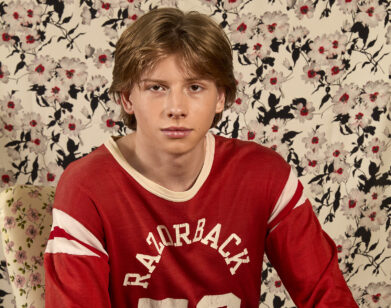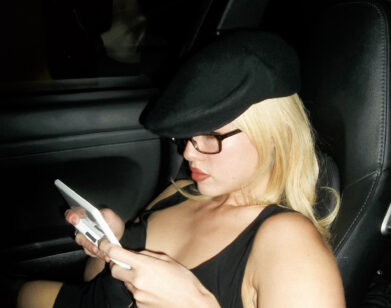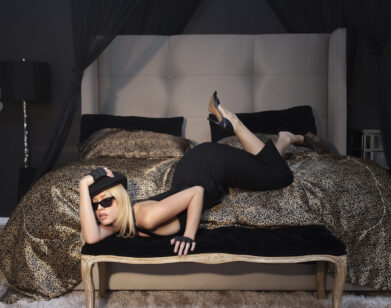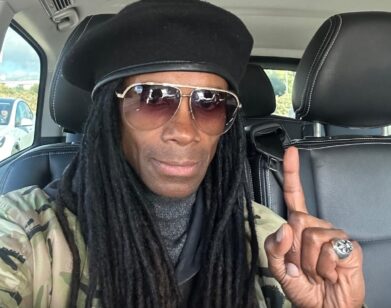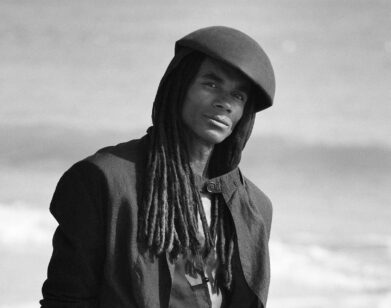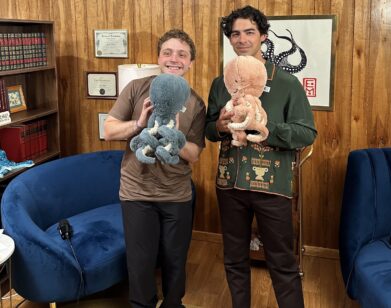School of Seven Bells is Ringing in Your Ears
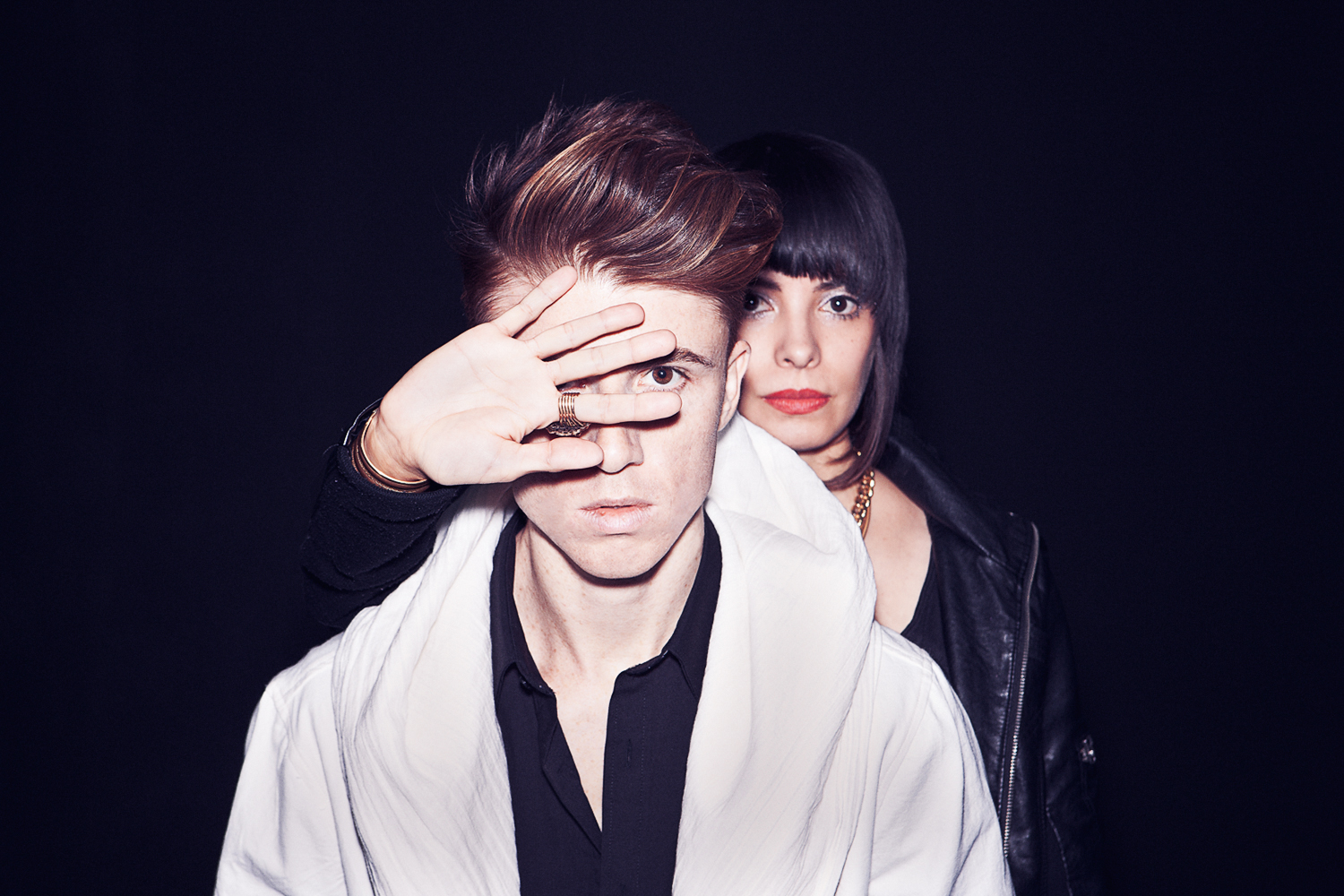
ABOVE: SCHOOL OF SEVEN BELLS’ BENJAMIN CURTIS (LEFT) AND ALEJANDRA DEHEZA. IMAGE COURTESY OF JUSTIN HOLLAR
There’s something primal about School of Seven Bells’ particular brand of dream pop. The ethereal vocals Alejandra Deheza and the churning soundscapes of Benjamin Curtis create a ghostly yet danceable blend, drawing out influences from the dense guitar-driven shoegaze genre to percussive electronic music.
The band was originally a trio, coming together in 2007 after Curtis left his old band Secret Machines and Deheza and her twin sister, Claudia, came over from project called On!Air!Library! Claudia left the band in 2010, leaving a void, particularly when it came to the band’s signature dual vocals. But School of Seven Bells has continued onward, most recently releasing an EP called Put Your Sad Down in November.
Alejandra Deheza spoke to Interview about the band’s new music, growing up in Florida, and moving to New York.
ROLAND LI: How does the new EP compare with your previous albums?
ALEJANDRA DEHEZA: It wasn’t thrown together, but it wasn’t something we planned on. We didn’t feel that much pressure with it, and we didn’t give ourselves a deadline. I felt with the other records, there was a lot of planning involved. We were in between tours, so there was pressure with deadlines. With this one, we felt like we just wanted to relax and make a record in a space that we had never done before. We never really did anything just for fun. With this one, we weren’t even planning on making it, but people heard it and they really liked it.
LI: What are some of the themes or subjects that you’re trying to touch on lyrically?
DEHEZA: I didn’t really even have a chance to think about that. It felt very spur of the moment. Lyrically, I feel like there are things I always go back to, having to do with relationships.
LI: The first song and title track on the EP is 12 minutes long, with a pretty big ambient part in the middle. Was that a conscious departure from your shorter songs?
DEHEZA: No, actually that’s very similar to what we end up doing our rehearsal space. We don’t have to think about how many songs we had to fit on a record, so we made it 12 minutes. It’s very normal for Benjamin to decide to drop in some seven-minute world in the middle of a song. I think he doesn’t do it more often because there are usually time restraints on the record. I think it’s really funny though, because it starts off as a really poppy song, and then it totally takes a different turn in the middle and comes back. I was thinking, when people first hear it, I don’t know if they’ll make it past the five-minute mark. If I heard it, I would be like, what is going on?
LI: You guys added live drums a couple years ago. Has this affected your studio work?
DEHEZA: I think beats have always been really important to us. I’m not sure that this record is more influenced by electronic music than the other ones, because I think they all were. For Put Your Sad Down, it was all programmed beats.
LI: You’ve also been categorized in the shoegaze genre. Is that something you grew up listening to?
DEHEZA: I definitely like shoegaze. Oddly enough, it wasn’t what I grew up listening to a lot. I listened way more to freestyle because I grew up in South Florida, and that’s pretty much what was on the radio. I can totally hear influences, and it’s definitely influenced me because the music is so beautiful. I mean, how could it not stick in your brain when you’ve heard a record like [My Bloody Valentine’s] Loveless.
LI: When did you move to New York?
DEHEZA: I moved here in ’99, so I’ve been here a long time. Ben moved here in 2000.
LI: Was it a pretty big change from Florida?
DEHEZA: Definitely. I spent about a year not knowing where to go and what to do at all. I felt back then it was easier to fall into these parties where everyone was a musician. It was almost encouraged, if you weren’t in a band, to join one. I didn’t come up here thinking I was going to do music at all.
LI: What made you decide to move to New York?
DEHEZA: For me, it was simply a change. I had been here before, but only for a week, and it made a big impression. I knew I was going to move to New York eventually. I just started saving. It’s such a legendary and romantic city. If you love cool music or cool writers growing up, this is the place to be.
LI: Definitely. How did it feel starting out when bands like Interpol and Yeah Yeah Yeahs were getting big?
DEHEZA: It was so exciting. It was so great to have so many people around you who were working really hard and having their music heard by so many people. I think that’s a good energy to be around.
LI: Have things changed in the local scene?
DEHEZA: I think it’s just as full of energy and just as creative now. It seems to be bigger. I feel there are a lot more bands now.
LI: How do you feel illegal downloading and, now, streaming music has affected the business side?
DEHEZA: I think there’s always a concern with that, but in a way, it forces you to really look at your live show and one-on-one connection with the fans. That’s something that’s really good to come out of it. It’s harder, for sure, if you have to sell records to make a living. But in a way, I feel it’s definitely opened up the artist more to the fans. I think there’s more of a connection, because you have to connect to keep people coming back. I think that’s such an important relationship anyways. I think it’s cool that’s pretty much the driving force. If your band wants to stay around, you’ve got to connect more.
LI: Were you comfortable performing on stage initially?
DEHEZA: It’s really weird. When I was a kid, I had zero qualms with it. I loved being on stage. If you threw me on a stage, that’s where I would live, probably. But in the early shows that I had—especially because I started as an experiment—in the early bands, there was definitely stage fright. I would get so scared before shows, to the point where I would call my mom and say, I think I’m coming home, an hour before the show. Obviously, I got over it. I definitely think it goes away with practice.
LI: Were you around a lot of music growing up?
DEHEZA: There was a lot of music in our house. My father was an opera singer when he was younger, before I was born. He had a huge record collection. I played flute for around eight years, and I was obsessed with it. But as far as being in a band or singing on stage, that’s something I never thought I’d be doing.
LI: Do you still play flute?
DEHEZA: I tried to pick it up a few years ago. It’s not like riding a bike. I was surprised by how much you lose. I think if I applied myself, I could get it back to where I was, but no, I don’t play it anymore. I play guitar in the band. I’ll write on keys if I have ideas to put down. I think I’m more of a singer now. To me, it takes just as much practice to write your songs. It takes a lot for me to be happy with a song, so that’s enough on my plate now.
LI: What can we expect from School of Seven Bells this year?
DEHEZA: We’re writing the new record right now. I’m hoping to get something out by the end of the year. It’s definitely in progress.
LI: If you weren’t making music, what would you be doing?
DEHEZA: I thought I was going to be a writer. I had this big notion that I would be a poet in New York. I guess I still am. Lyrics are poetry.
SCHOOL OF SEVEN BELLS PLAYS MUSIC HALL OF WILLIAMSBURG ON THURSDAY, JANUARY 31. FOR MORE ON THE DUO, VISIT THEIR WEBSITE.

